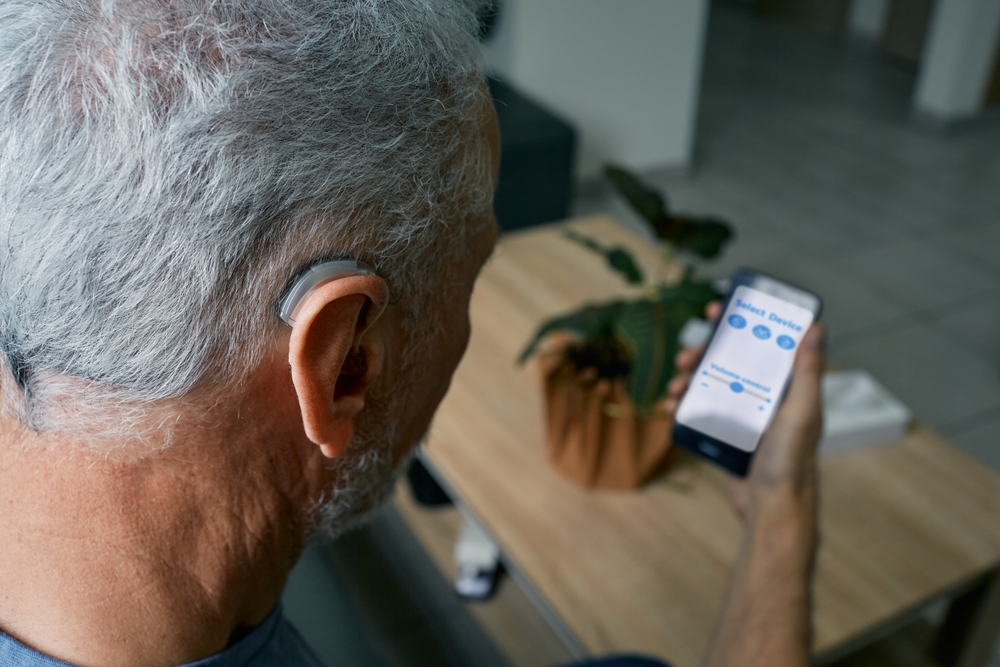A 2018 Merck Manuals survey found 63% of Americans believe wearing hearing aids improve our lives for those experiencing hearing loss.
Conversely, the International Journal of Audiology reports that 80% of adults age 55 to 74, who would benefit from a hearing aid, do not use them.
This represents a huge gap in the way hearing aid technology in the US is perceived. It will take time before we see a significant change in those numbers. But the following technological improvements will hopefully drive a major change in attitude toward wearing hearing aids.
52% say modern hearing aids are barely noticeable
There has long been a stigma associated with wearing hearing aids. One of the main reasons for this stigma was because everyone could see that you were wearing them.
The Merck Manuals survey respondents felt hearing aids made them look older than they were. They chose to endure constant arguments about TV volume and asking people to repeat themselves, rather than wearing hearing aids.
They just didn’t see enough benefit to justify purchasing and wearing hearing aids. That attitude is changing, however, since the majority of people now realize few people will ever know they are wearing them. Many have come to realize that hearing aids improve our lives
90% say they know to avoid loud noise, but only 64% do
Thanks in part to online educational articles, a higher percentage of people across age, education, and income levels are better informed about hearing loss. They are now aware that the leading cause of the hearing loss we associate with aging is loud noise.
Because of the advanced technologies that can largely restore hearing, people know they have options when they experience noise-induced hearing loss.
Prevention is always your best option, but it’s comforting to know that if you haven’t protected your hearing, modern hearing aids can provide a more appealing solution than in decades past.
Integrated wearable technology
Do you wear a fitness tracker? How about wireless Bluetooth headphones? Do you wear an emergency alert pendant?
You probably already own technology that can sync to modern hearing aids, which will allow you to hear better and adjust sounds to match your level of hearing loss and allow hearing aids to improve your lives
Modern hearing aids don’t simply amplify sound. They’re often compatible with smartphones, smart TVs and sound systems, which bring music and dialog straight into your ears. Some hearing aids can even detect when you fall, and alert emergency responders, similar to an alert pendant.
Hearing aids can track your daily activity and heart health just as a fitness tracker does. They use advanced artificial intelligence to adapt for optimal hearing in every setting. They can eliminate background noise and transmit the sounds you want to hear.
Hearing aids can do all of this in a very compact, barely noticeable package.
Health and life benefits
Lastly, a flurry of recent scientific studies has demonstrated the damaging effects of not treating hearing loss, as well as the benefits of wearing hearing aids.
Among these findings, individuals with untreated hearing loss, when compared to their peers who receive treatment, are:
- 28% more likely to report profound sadness or depression
- Up to 70% more likely to experience paranoia
- 30% more likely to give up social activities they love and avoid people (which can lead to social isolation)
- Up to 500% more likely to experience cognitive decline and memory loss (dementia)
- Up to 300% more likely to have a serious fall that leads to a hospital stay
- Making around $12,000 less per year in the workplace
- Experiencing slow brain atrophy which is visible on an MRI scan
- Having more arguments with loved ones
- More likely to go to the ER and stay longer in the hospital
- More likely to have trouble following a doctor’s instructions, which can cause additional harm
These studies didn’t simply examine increased risks. In each case, the study demonstrated that as hearing loss worsened, risk increased.
They also showed that those wearing hearing aids reduced their risks to the level of their same-age peers who weren’t experiencing hearing loss.
The last two points make the studies even more consequential. They don’t just point out a problem, they demonstrate hearing aids are a viable solution.
Changing attitudes regarding hearing aids
You’re living through a major shift in attitudes about hearing aid technology. Science and public perception are catching up with the fact that modern hearing aids improve our lives and are essential for those who want to maintain their quality of life as they age.
You should talk to a hearing specialist as soon as possible about potential solutions to your hearing loss.


